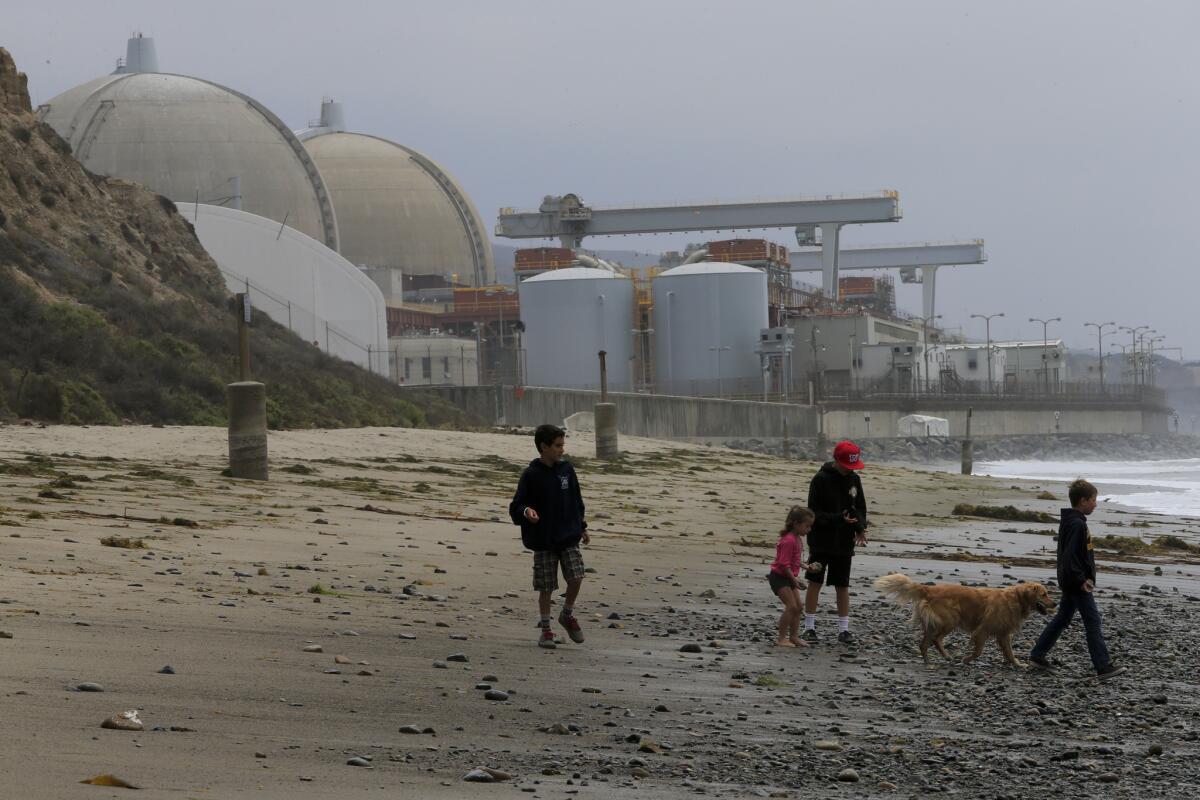San Onofre closure will remake local power grid, PUC chief says

- Share via
The head of the California Public Utilities Commission said Tuesday that the permanent closure of the San Onofre nuclear plant leaves significant unanswered questions about the future energy supply for Southern California, particularly for San Diego and southern Orange counties.
“How much we pay for power, how much we need, what kind of summers we have for the next couple of years, these are all matters of some uncertainty,” CPUC Chairman Michael Peevey said in a meeting with The Times.
Southern California Edison, the majority owner of San Onofre, decided last week to shut the troubled plant for good, citing mounting costs and uncertainty about when and if federal regulators would give the go-ahead for the plant to restart.
Q&A: Why is San Onofre nuclear plant closing? How much will this cost?
Peevey said the decision allows energy officials with the CPUC, the California Energy Commission, the California Independent System Operator and other entities to begin making definitive plans for a grid without San Onofre.
“The indecision this has caused has had the effect of freezing things here,” he said.
In the short term, Edison will have to continue buying power from elsewhere to replace the nuclear plant’s 2,200-megawatt output, Peevey said: “The question is from where and under what terms and conditions?”
FROM THE ARCHIVES: San Onofre Nuclear Generating Station
Edison Chief Executive Ted Craver said last week that the company has spent more than $500 million on replacement power since the plant was shut down in January 2012 because of unusual wear on tubes carrying radioactive water in its newly replaced steam generators.
The CPUC will eventually have to decide whether ratepayers or shareholders will pick up the tab for the replacement power, as well as for the plant’s operating costs during the outage and the $768.5-million cost of the steam generator replacement. The cost question is the subject of an ongoing investigation by the commission.
Peevey said energy officials will need to place more emphasis on efficiency and demand response, but that Southern California will also need upgrades to its transmission system and to either build new plants or repower plants along the coast that would otherwise be forced to close because of new regulations on the use of ocean water for cooling.
“We’re going to have to have some generation, gas-fired, in those areas, and they will inevitably be CO2 emitters,” Peevey said.
He said he was hopeful that the new generation could be achieved primarily by repowering some of 11 gas-fired plants along the coast that might otherwise close rather than performing expensive upgrades to meet the new “once-through” cooling regulations.
While repowering those plants would be contingent on their owners deciding that it makes economic sense, doing so would be a much easier process than building entirely new plants, Peevey said.
“Where could you possibly build another power plant in Southern California?” he said.
He defended the CPUC’s decision in 2005 to authorize Edison to go ahead with the steam generator replacement on the ratepayers’ dime.
Edison argued at the time that the project would end up saving customers money because the power produced at San Onofre is significantly cheaper than building new plants or importing electricity from other parts of California and the West. Ratepayer advocates argued that under a number of possible circumstances -- including a one-year outage at the plant -- the project would be a bad deal for customers.
“It looked like a good deal at the time,” Peevey said. “The economics all looked like it was very favorable to the customers. A $760-million investment in steam generators ... was a lot cheaper than buying 2,200 megawatts of power any place else.”
ALSO:
Hathaway wildfire near Banning burns nearly 2,000 acres
Worker killed in accident at new 49ers stadium, officials say
2 wounded in alley shooting near Santa Monica College, police say
Twitter: @sewella
More to Read
Sign up for Essential California
The most important California stories and recommendations in your inbox every morning.
You may occasionally receive promotional content from the Los Angeles Times.











